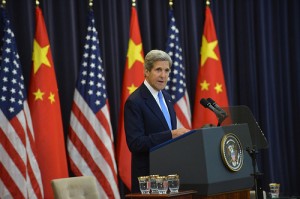
U.S. and China Agree to Climate Cooperation

Sec. Kerry at U.S.-China Strategic Economic Dialogue July 10, 2013 (Photo: DoS)
The United States and China came to an agreement on July 10 to work together on several key areas to reduce greenhouse gas emissions. As the two largest polluters in the world – representing 40% of total emissions – the actions of the U.S. and China will be critical to determining the course of global climate change in the coming decades.
The agreement occurred at the fifth annual U.S.-China Strategic Economic Dialogue. It came from a report authored by a new U.S.-China Working Group on Climate Change, which was created after Sec. Kerry’s April 2013 trip to China. The Working Group issued the report that detailed five areas of cooperation on climate change: cleaner heavy-duty trucks; carbon capture and storage; energy efficiency in buildings, industry, and transport; data collection on greenhouse gases; and smart grids. The Working Group will report back in October on the progress being made.
The deal between U.S. and China comes after an agreement announced by President Barack Obama and Chinese President Xi Jingping in California in June 2013. Both Presidents pledged to work together to cut hydrofluorocarbons (HFCs). HFCs are used in refrigerators, air conditioners, and other industrial applications, and although less common than carbon dioxide, they are much more potent greenhouse gases.
The idea behind the most recent agreement is that by taking on some of the largest sources of emissions in both countries, the U.S. and China can secure big reductions in greenhouse gas emissions. Perhaps more importantly, by coming to a bilateral agreement between the two biggest emitters, they can build some momentum towards a global agreement on reductions.
Disagreement between the U.S. and China (as well as the disparate opinions of a variety of other nations) on how to deal with climate change has plagued international negotiations for years. The U.S. will not sign up to an agreement that doesn’t include mandatory reductions by other big emitters, including China. From China’s perspective, the U.S. has a longer history of polluting, which they say gives the U.S. a greater obligation to cut back.
While these hardened positions have stymied a climate deal up until now, the latest bilateral agreement could boost the chances, albeit in a small way, of a larger agreement. The world hopes to come to an agreement at the Conference of Parties (COP 21) meeting in Paris in 2015.
Secretary of State John Kerry, a founding member of The American Security Project, said in his opening remarks of the dialogue, “I want to underscore that when we make a decision…it ripples beyond our borders.”





